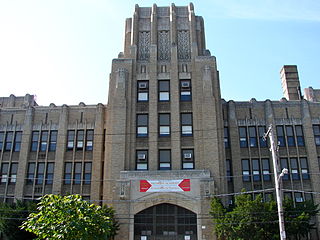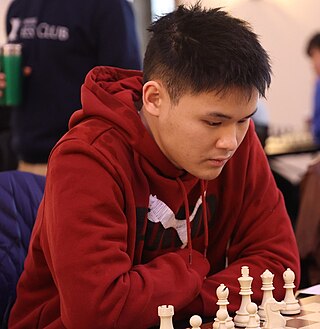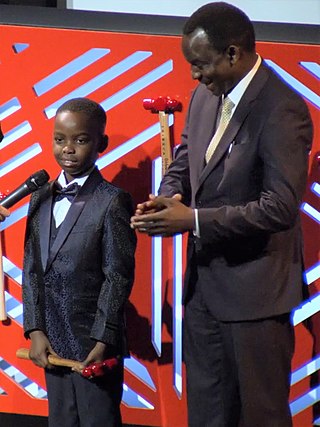Related Research Articles

The United States Chess Federation is the governing body for chess competition in the United States and represents the U.S. in The World Chess Federation (FIDE). USCF administers the official national rating system, awards national titles, sanctions over twenty national championships annually, and publishes two magazines: Chess Life and Chess Life Kids. The USCF was founded and incorporated in Illinois in 1939, from the merger of two older chess organizations. It is a 501(c)(3) non-profit organization headquartered in St. Louis, Missouri. Its membership as of 2020 as COVID hit was 97,000; as of 2024 the membership was 112,000.

Emory Andrew Tate Jr. was an American chess player who held the title of International Master. He was the father of the Internet personality Andrew Tate.
Kenneth Roger Clayton was an American chess master. He won US Amateur Chess Championship in 1963. He attended Harvard University. His picture was on the cover of the June 1963 issue of Chess Life magazine.

Amon Simutowe is a Zambian chess grandmaster. He is the first grandmaster from sub-Saharan Africa and the third black chess grandmaster in history, after Maurice Ashley and Pontus Carlsson. He holds a Bachelor of Science in Economics and Finance from the University of Texas at Dallas and a Master of Science in Economics for Development from the University of Oxford.
Kangugi "K. K." Karanja is an American chess player and former chess prodigy. He became a US Chess Federation Candidate Master at the age of 10.
A chess rating system is a system used in chess to estimate the strength of a player, based on their performance versus other players. They are used by organizations such as FIDE, the US Chess Federation, International Correspondence Chess Federation, and the English Chess Federation. Most of the systems are used to recalculate ratings after a tournament or match but some are used to recalculate ratings after individual games. Popular online chess sites such as Chess.com, Lichess, and Internet Chess Club also implement rating systems. In almost all systems, a higher number indicates a stronger player. In general, players' ratings go up if they perform better than expected and down if they perform worse than expected. The magnitude of the change depends on the rating of their opponents. The Elo rating system is currently the most widely used. The Elo-like ratings systems have been adopted in many other contexts, such as other games like Go, in online competitive gaming, and in dating apps.
Robert Gwaze is a Zimbabwean chess player. He is a former student at Prince Edward School, in Harare. At age 15, he was a Zimbabwe National Chess Champion at both junior and senior levels.

The Promise Academy at Roberts Vaux High School is an historic, American high school building that is located in the North Central neighborhood of Philadelphia, Pennsylvania.

Awonder Liang is an American chess Grandmaster. A chess prodigy in his youth, he was the third-youngest American to qualify for the title of Grandmaster, at the age of 14. Liang was twice world champion in his age category.
The Zambian Closed Chess Championship is the national chess championship of Zambia, organized by the Chess Federation of Zambia. Zambia's only grandmaster Amon Simutowe won the championship in 1996 at the age of 14.

Sunil Weeramantry is a Sri Lankan-born American chess player, trainer and chess author known for being the trainer of his stepson Hikaru Nakamura.
Frank Street Jr. was an African-American chess player who won the U.S. Amateur Championship in 1965. He was a member of the Takoma Park Chess Club, a club featuring notable members such as Larry Kaufman and Larry Guilden. In the 1960s, Street Jr was seen as a pioneer for black chess players in the Washington DC area, along with National Masters Walter Harris and Ken Clayton.

Tanitoluwa Emmanuel "Tani" Adewumi is a Nigerian-American chess player who currently holds the title of FIDE Master (FM). A chess prodigy, he won the 2019 K-3 New York State chess championship at the age of 8 after having played the game for only a year while living with his refugee family in a homeless shelter in Manhattan.
The chess events at the 2003 All-Africa Games were held from 5 to 17 October at the Nicon Hilton Hotel in Abuja. This was the first time chess was contested at the All-Africa Games. The four events were men's and women's team competitions at rapid time controls, and men's and women's individual competitions at blitz time controls. Teams played matches on four boards: each team consisted of a minimum of four players and up to two optional reserve players. In the team competitions, medals were awarded to the teams scoring the highest number of board points, as well as to individual players with the best performances on each board in terms of win percentage.

Justus D. Williams is an American chess player who holds the title of International Master (IM).
Joshua Colas is an American chess player who holds the title of FIDE International Master (Elect).

Kassa Korley is an American-born Danish chess player who holds the title of International Master (IM).

James A. Black Jr. is an American chess player.
James H. Canty III is an American chess player and streamer.
Brewington Hardaway is an American chess player and prodigy.
References
- ↑ Shabazz, Daaim (February 17, 2022). "Black History Month 2022-Day 17: Walter Harris".
- 1 2 Shabazz, Daaim (July 15, 2014). "Meeting Walter Harris, Chess Pioneer".
- ↑ "Black History in Chess".
- ↑ Shabazz, Daaim (March 2, 2007). "The Rising of the Black Star".
- ↑ Basch-Gould, Nathaniel (February 11, 2022). "Story Time History: Black Players Who Changed the Game".